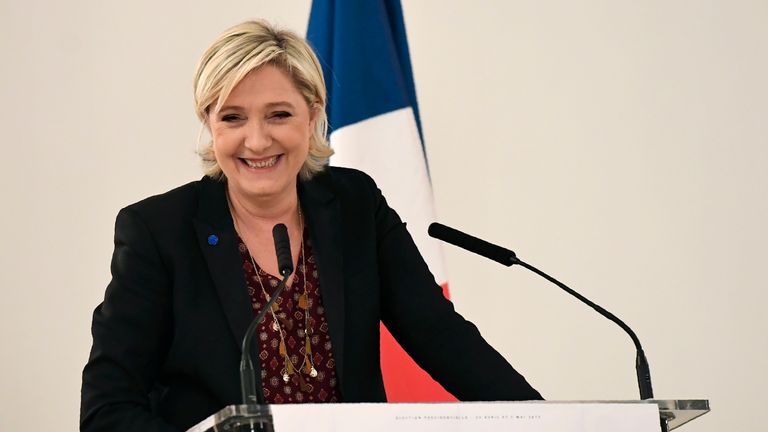What next for France's dream of secularism?
The definition and future of France's treasured secularism will depend very much on who wins the election, writes Sam Kiley.
Tuesday 7 March 2017 09:34, UK
French elections have seldom been less predictable, nor so fraught with grand philosophical terms for which there are no equivalent words in English.
Just as the cynical British find it hard to comprehend how a French person, no matter how brainy, could refer to themselves as an "intellectual", so they also struggle to comprehend the concept of laicite.
Britain's head of state, the Queen, is also head of the Church of England. In the United Kingdom's second chamber there are 26 Lords Spiritual, who take an active part of legislation alongside the Lords Temporal. There is no separation of state.
But neither is Britain an especially religious country - tolerance seems cultural, rather than legally enforced.
Not so in France, where a final wedge was driven between the (Catholic) Church and the political state in 1905 during the Third Republic. This was when the term "laicite" was born. It derives from the word laics meaning laity and is now a central pillar of what many believe to be the essence of Frenchness.
Under the Constitution of the Fifth Republic, laicite "assures the equality of all citizens before the law, without distinction to their origin, race, or religion. It respects all religious beliefs".
This tradition goes to the heart of contemporary French life and politics today.
It has underpinned a long held belief across the ideological divide that led Francois Hollande, the enfeebled outgoing president, to decree that France should not recognise cultural and religious differences, much less celebrate them, but rather embrace the idea of a unified "people Francais".
This is so entrenched in France that, for example, that there is no census data on the ethnic or religious backgrounds of its citizens.
It's a sweet idea but it has not worked - at least in the eyes of people in the front line of France's most dangerous schism: the rift between immigrants and the rest.
"The idea has been to ignore our differences, not see them and try to overcome them. It has been a disaster," a senior law enforcement official told me in Nice more than a year before a French citizen of Tunisian origin killed 86 people with a 19-ton truck.
France's socialists and the far right National Front Party of Marine Le Pen have tried to harness laicite to their own political ends.
Ms Le Pen's party is virulently anti-immigration and she is riding a wave of support that has kept her in the top two places throughout the presidential race.
Critics have suggested that laicite, which forbids manifestations of religious conviction in state school and has resulted in the bizarre burkini ban on Nice's beaches, is a secular doctrine rivalling a theological creed.
As such, the far right has been most successful in "weaponising laicite".
Ms Le Pen recently won plaudits among her followers for refusing to cover her hair and walking out of a meeting with a senior French Muslim cleric.
"Muslim terror" and how to cope with it.
The failure of the French policy of "assimilation", driven by laicite, and the growing sense of alienation among many Muslims who simply cannot comprehend what many see as an injunction to abandon their faith, has resulted in deep divisions within French society.
Some, mostly liberals and Muslims, see laicite today as a gossamer facade for Islamophobia.
But with the rise of Emmanuel Macron from the En Marche movement who, although he served a socialist president, is not tied to a recognisable political philosophy, France is beginning to see a rebranding of laicite that could take it away from a secular theology and, perhaps, back to its root meaning.
A centrist independent, Mr Macron is likely to face Ms Le Pen in a runoff for the presidency.
She may represent the feelings of many in France that Muslims should show greater respect for laicite.
She's happy to lose the support of France's Muslims, who make up an estimated 10% of the population.
That loss is Mr Macron's gain and he has opted for a different definition of laicite.
And when it comes to the runoff he'll be likely to secure the left-wing vote that does not want to see secularism co-opted entirely by the extreme right.
He may be able to move laicite from what is seen as a wilful refusal to acknowledge difference back to what those who first coined the term may have really meant - tolerance.
That won't be a solution to French tensions - but it may begin to set new terms for discussing the problem.






